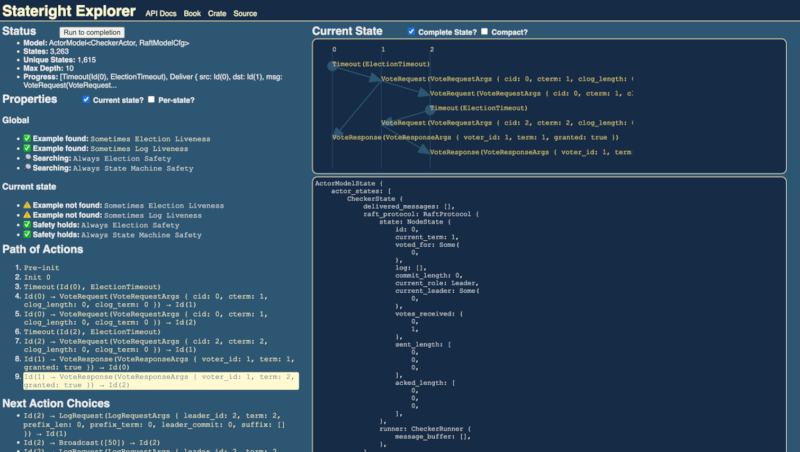8 releases
| 0.2.7 | Feb 24, 2024 |
|---|---|
| 0.2.6 | Feb 7, 2024 |
| 0.2.2 | Jan 2, 2024 |
| 0.1.0 | Dec 31, 2023 |
#1442 in Network programming
163 downloads per month
410KB
1.5K
SLoC
Raft Lite
Raft Lite is an easy-to-understandable and formally verified implementation of the Raft consensus algorithm. It is intended to be used as a learning tool for those who are interested in understanding how Raft works internally.
The Raft algorithm is implementedin src/raft_protocol.rs, which is a event loop that handles all the application requests, Raft protocol messages and timer events. You can find the detailed explanation of this part in this blog post.
The model checking code is in src/model_check.rs. It uses stateright, a model checker for distributed systems. You can find the detailed explanation of this part in this blog post.
Use Raft Lite as a library
Add this to your Cargo.toml:
[dependencies]
raft-lite = "0.2.7"
To use it in your project, you can initialize a Raft instance with a RaftConfig. The way you interact with the Raft instance is to send messages to it and receive messages from it. The message type is Vec<u8>. The Raft protocol will guarantee the message delivery is in total order.
The following example shows how to use Raft Lite to achieve a single value consensus. The example is in examples/dinner.rs.
use raft_lite::config::{RaftConfig, RaftParams};
use raft_lite::persister::AsyncFilePersister;
use raft_lite::raft::Raft;
use std::path::PathBuf;
#[tokio::main]
async fn main() {
let guests = vec![
"localhost:10624".to_string(),
"localhost:10625".to_string(),
"localhost:10626".to_string(),
];
let dinner_options = vec![
b"Ratskeller".to_vec(),
b"Pizzeria Ristorante Lachoni".to_vec(),
b"KFC".to_vec(),
];
// spawn a raft instance for each guest
for i in 0..guests.len() {
let guests = guests.clone();
let dinner_options = dinner_options.clone();
tokio::spawn(async move {
let mut raft = get_raft_instance(guests.clone(), guests[i].clone());
// one for broadcast, one for receive
let (raft_broadcast_tx, mut raft_receive_rx) = raft.run();
// send dinner option of this guest
let place = dinner_options[i].clone();
raft_broadcast_tx.send(place).unwrap();
// receive dinner options of all guests
let mut count = 0;
loop {
let msg = raft_receive_rx.recv().await.unwrap();
count += 1;
if count == 2 {
// The last message is the final decision
let final_decision = String::from_utf8(msg).unwrap();
println!("Guest {}: we'll have dinner at {}!", i, final_decision);
}
}
});
}
tokio::time::sleep(tokio::time::Duration::from_secs(5)).await;
}
fn get_raft_instance(peers: Vec<String>, self_addr: String) -> Raft {
let path: PathBuf = PathBuf::from(format!("./data/dinner]/{self_addr}"));
let raft_config = RaftConfig::new(
peers.clone(),
self_addr.clone(),
RaftParams::default(),
Some(path),
);
Raft::new(raft_config)
}
Run model checking against Raft Lite
Run interactively
You can run the model checking interactively by running the following command:
cargo run -- -m explore
As shown in the following screenshot, the sequence diagram shows that two nodes are elected as leaders with different terms.

Run in command line
You can also run the model checking in command line to find all possible states and transitions given a certain number of steps (depth).
cargo run -- -m check --depth 10
It will show all counterexamples that violate the specified Always properties and examples that satisfy the specified Sometimes properties.
My laptop gives the following output in less than 1 second:
$ cargo run -- -m check --depth 10
Checking. states=4, unique=4, depth=1
Checking. states=475674, unique=133824, depth=10
Checking. states=917040, unique=256771, depth=10
Done. states=924710, unique=259150, depth=10, sec=3
Discovered "Election Liveness" example Path[3]:
- Timeout(Id(0), ElectionTimeout)
- Deliver { src: Id(0), dst: Id(1), msg: VoteRequest(VoteRequestArgs { cid: 0, cterm: 1, clog_length: 0, clog_term: 0 }) }
- Deliver { src: Id(1), dst: Id(0), msg: VoteResponse(VoteResponseArgs { voter_id: 1, term: 1, granted: true }) }
Fingerprint path: 13280538127433316798/18417327358524522001/10876327409151634344/11261648250825353397
Discovered "Log Liveness" example Path[6]:
- Timeout(Id(2), ElectionTimeout)
- Deliver { src: Id(2), dst: Id(0), msg: VoteRequest(VoteRequestArgs { cid: 2, cterm: 1, clog_length: 0, clog_term: 0 }) }
- Deliver { src: Id(0), dst: Id(2), msg: VoteResponse(VoteResponseArgs { voter_id: 0, term: 1, granted: true }) }
- Deliver { src: Id(2), dst: Id(2), msg: Broadcast([50]) }
- Deliver { src: Id(2), dst: Id(0), msg: LogRequest(LogRequestArgs { leader_id: 2, term: 1, prefix_len: 0, prefix_term: 0, leader_commit: 0, suffix: [LogEntry { term: 1, payload: [50] }] }) }
- Deliver { src: Id(0), dst: Id(2), msg: LogResponse(LogResponseArgs { follower: 0, term: 1, ack: 1, success: true }) }
Fingerprint path: 13280538127433316798/5012304960666992246/2656658050571602193/12788966706765998312/12610557528799436519/6208176474896103011/7212898540444505159
License
The project is under MIT license.
Related Projects
- StorgataDB: A distributed key-value store built on top of Raft Lite.
Dependencies
~17–28MB
~399K SLoC